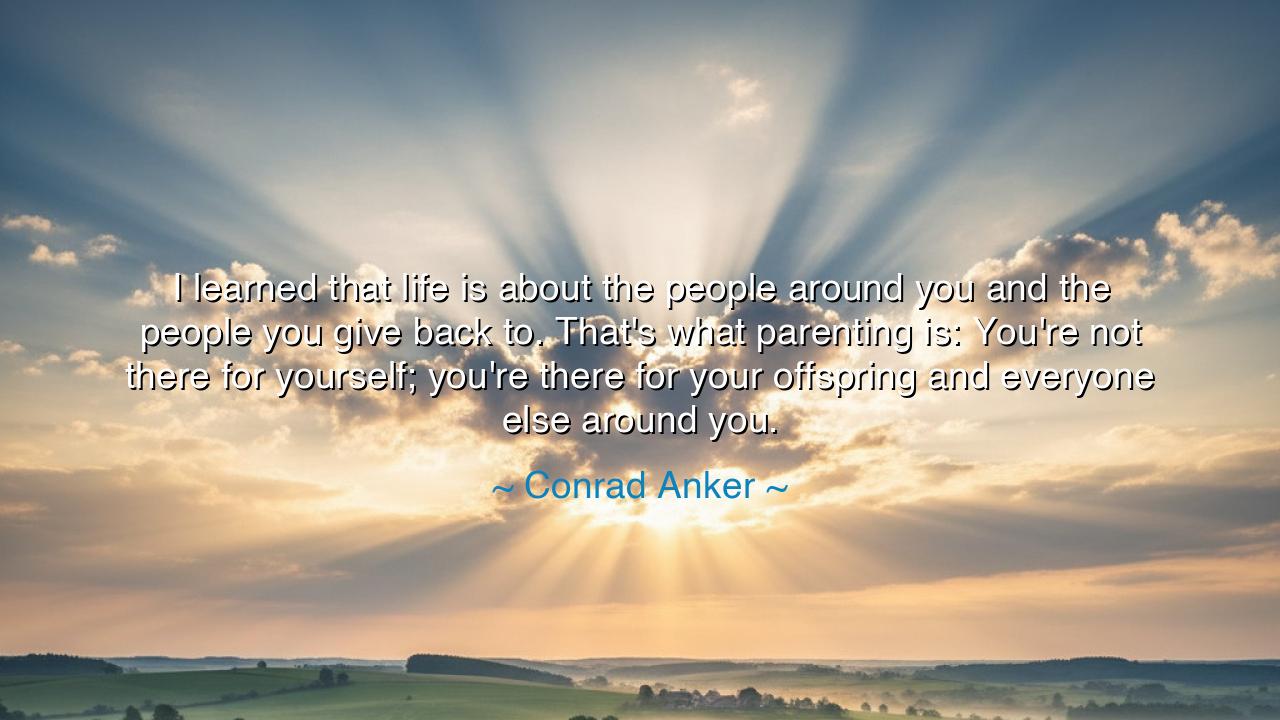
I learned that life is about the people around you and the
I learned that life is about the people around you and the people you give back to. That's what parenting is: You're not there for yourself; you're there for your offspring and everyone else around you.






The words of Conrad Anker strike with the clarity of mountain air: “I learned that life is about the people around you and the people you give back to. That's what parenting is: You're not there for yourself; you're there for your offspring and everyone else around you.” In this confession lies a truth as old as the human family—that life finds its deepest meaning not in self-seeking, but in service. To be a parent, Anker tells us, is to step beyond the narrow circle of the self and live for the sake of others.
The ancients often taught this lesson through parable and story. They told of rivers, which do not drink their own waters, and of trees, which do not eat their own fruit. The river flows outward, the tree gives freely—and so should the life of a parent. In the same way, parenting is the great shift of life: a turning from “I” to “we,” from self-preservation to sacrifice, from personal ambition to the shaping of future generations. This transformation, though difficult, is the highest expression of love.
History bears witness to this truth. Consider the life of Marcus Tullius Cicero, who, amidst the tumults of Rome, wrote tenderly of his devotion to his daughter, Tullia. Though a statesman consumed with politics, he poured his heart into her well-being, confessing in letters that her presence gave him purpose beyond ambition. When she died, his grief was immeasurable, for she had been the anchor that reminded him that life was not for himself alone, but for those entrusted to his care. His story reveals what Anker declares: life is about the people you give back to.
Anker’s imagery also speaks to his own life as a mountaineer, where survival depends on partnership, trust, and sacrifice. A climber tethered to others on a rope knows that each move, each step, is not for himself alone but for the safety of all. In this, he learned that parenting is the same. A father or mother climbs not for their own summit, but for the children tied to them, depending on their strength. And in this struggle, they discover the noblest truth: that love means putting another’s ascent before one’s own.
The wisdom here is heroic yet humble: greatness is not measured in personal triumphs, but in what one gives. Parenting is not only the raising of a child, but the weaving of community, for every lesson, every sacrifice, every act of care ripples outward to touch not only the child but also the neighbors, the friends, the greater family of humanity. To live for others is to magnify the meaning of one’s life.
The lesson for us is clear: if you would live fully, live not for yourself alone. See in parenting a model of life itself—an opportunity to give, to nurture, to guide. Whether or not you are a parent by blood, you can be a parent by spirit, offering care, wisdom, and love to those around you. For the essence of life is not hoarded, but shared.
Practically, this means asking each day: who can I strengthen? Who can I guide? What can I give to my children, my family, my community, that will outlast me? It means remembering that your legacy is not what you keep, but what you give. In every act of generosity, you participate in the sacred calling Anker describes, a calling greater than ambition—the calling to live for others.
Thus, let Conrad Anker’s words endure like an ancient creed: “You’re not there for yourself; you’re there for your offspring and everyone else around you.” To embrace this is to find freedom from selfishness and to discover the deepest joy—that life’s purpose is fulfilled when we give ourselves away in love. In such sacrifice, we not only raise children—we raise humanity itself.






AAdministratorAdministrator
Welcome, honored guests. Please leave a comment, we will respond soon